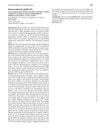 14 citations,
January 2018 in “Advances in Clinical Chemistry”
14 citations,
January 2018 in “Advances in Clinical Chemistry” The document concludes that hormonal biomarkers are key for diagnosing hyperandrogenemia in women and hypogonadism in men.
 17 citations,
February 2019 in “Journal of Clinical Medicine”
17 citations,
February 2019 in “Journal of Clinical Medicine” Testosterone replacement therapy should be used for men with low testosterone levels and symptoms of hypogonadism, after careful diagnosis and considering individual needs.
 6 citations,
January 2020 in “The Aging Male”
6 citations,
January 2020 in “The Aging Male” Testosterone replacement therapy improved blood sugar and fat levels without raising prostate cancer risk in Japanese men with low testosterone.
[object Object]  3 citations,
October 2022 in “International Journal of Impotence Research”
3 citations,
October 2022 in “International Journal of Impotence Research” Testosterone Replacement Therapy can improve sexual health in postmenopausal women with low sexual desire, but more research is needed on its long-term effects.
 1 citations,
March 2021 in “The Journal of Sexual Medicine”
1 citations,
March 2021 in “The Journal of Sexual Medicine” The letter suggests testosterone replacement therapy might worsen COVID-19 outcomes.
24 citations,
November 2007 in “Expert Opinion on Pharmacotherapy” New and future treatments for male hypogonadism include various forms of testosterone therapy and emerging drugs.
 September 2012 in “African Journal of Urology”
September 2012 in “African Journal of Urology” Testosterone replacement therapy improves libido, mood, muscle strength, and bone density in men with Testosterone Deficiency Syndrome.
 39 citations,
January 2019 in “The World Journal of Men's Health”
39 citations,
January 2019 in “The World Journal of Men's Health” Testosterone replacement therapy can prevent men from fathering children and should not be used by those wanting to stay fertile.
 77 citations,
May 2012 in “Expert Opinion on Emerging Drugs”
77 citations,
May 2012 in “Expert Opinion on Emerging Drugs” New treatments for male hypogonadism are effective and should be personalized.
10 citations,
October 2012 in “Andrology” Prostate cancer can progress even with low testosterone due to internal hormone production in the tumor.
 December 2024 in “Frontiers in Neurology”
December 2024 in “Frontiers in Neurology” Testosterone with finasteride improved muscle and bone health in men with spinal cord injury.

Hormones, especially testosterone and DHT, are key for penis development and function, and testosterone therapy may help with erectile dysfunction in those with low levels.
 1 citations,
October 2022 in “Springer eBooks”
1 citations,
October 2022 in “Springer eBooks” Testosterone is key for male sexual function, and treating hormone imbalances can improve sexual issues.
 35 citations,
January 2012 in “The Journal of Sexual Medicine”
35 citations,
January 2012 in “The Journal of Sexual Medicine” Androgen Deprivation Therapy for prostate cancer often reduces sexual function but intermittent therapy may be more tolerable.
 31 citations,
January 2017 in “Advances in Experimental Medicine and Biology”
31 citations,
January 2017 in “Advances in Experimental Medicine and Biology” Low testosterone and 5α-reductase inhibitors can harm men's metabolic and sexual health; testosterone therapy may help, but discussing 5α-RIs' side effects is important.
 March 2024 in “The journal of sexual medicine”
March 2024 in “The journal of sexual medicine” The therapies improved ejaculation disorders and sexual function in middle-aged men.
 39 citations,
November 2021 in “Clinical Endocrinology”
39 citations,
November 2021 in “Clinical Endocrinology” Testosterone replacement is recommended for men with low testosterone levels and symptoms of hypogonadism.
 February 2023 in “IntechOpen eBooks”
February 2023 in “IntechOpen eBooks” Testosterone replacement therapy helps manage deficiency and has various methods, but requires careful monitoring to avoid side effects.
5 citations,
May 2018 in “Therapeutic advances in drug safety” Androgen use may increase the risk of stroke, but more research is needed.
 16 citations,
November 2021 in “Antioxidants”
16 citations,
November 2021 in “Antioxidants” Managing oxidative stress might help treat low testosterone and related chronic diseases in aging men.
 9 citations,
May 2021 in “Dermatologic Therapy”
9 citations,
May 2021 in “Dermatologic Therapy” Possible link between androgens and COVID-19 severity; more research needed.
[object Object]  April 2022 in “Diabetes Therapy”
April 2022 in “Diabetes Therapy” Low testosterone does not prevent prostate cancer in men with type 1 diabetes.
 1 citations,
November 2008 in “Acta crystallographica”
1 citations,
November 2008 in “Acta crystallographica” Scientists successfully created and analyzed the structure of a part of the human androgen receptor with specific modulators and a peptide to understand how it binds differently in various tissues.
 29 citations,
July 2013 in “The Journal of Sexual Medicine”
29 citations,
July 2013 in “The Journal of Sexual Medicine” Testing for CAG repeat polymorphism in the androgen receptor gene is not currently recommended for managing hypogonadism.
12 citations,
October 2018 in “Aging male/The aging male” Higher BMI and lower testosterone are linked to more aggressive prostate cancer.
19 citations,
June 2021 in “The world journal of men's health” Using anabolic-androgenic steroids can harm men's reproductive health and increase the risk of heart problems and death.
 25 citations,
March 2000 in “Journal of Endocrinological Investigation”
25 citations,
March 2000 in “Journal of Endocrinological Investigation” Testosterone therapy aims to treat hormone deficiencies and various conditions safely and effectively, but requires careful patient monitoring due to potential side effects.
 28 citations,
October 1998 in “Baillière's clinical endocrinology and metabolism”
28 citations,
October 1998 in “Baillière's clinical endocrinology and metabolism” Testosterone replacement may help post-menopausal women with androgen insufficiency, but more research is needed on its benefits and risks.
 70 citations,
March 2016 in “Urologic Clinics of North America”
70 citations,
March 2016 in “Urologic Clinics of North America” The document explains how the male reproductive system works, its role in making testosterone, and how conditions like obesity can disrupt it, leading to low testosterone and fertility issues.
60 citations,
July 2018 in “Circulation” Low testosterone can cause a heart rhythm problem in men, but fixing it can prevent the issue.
























